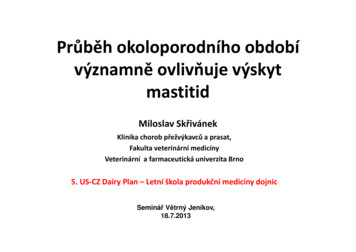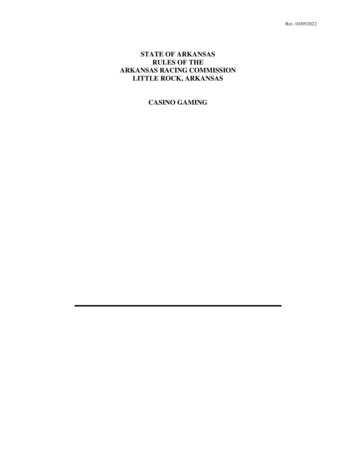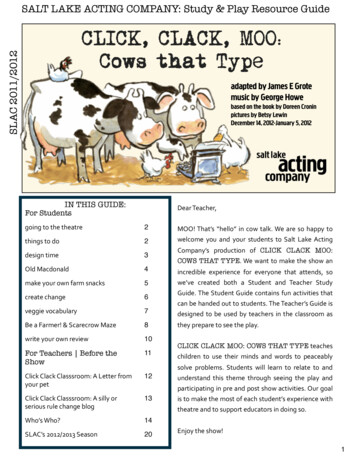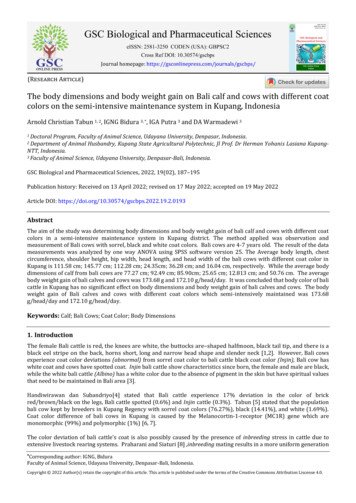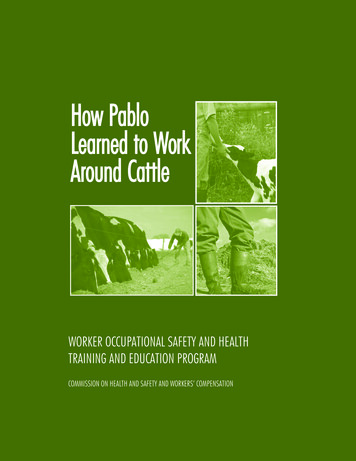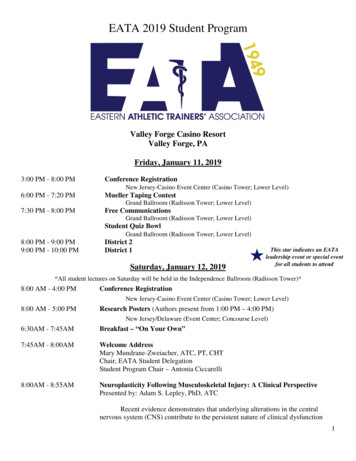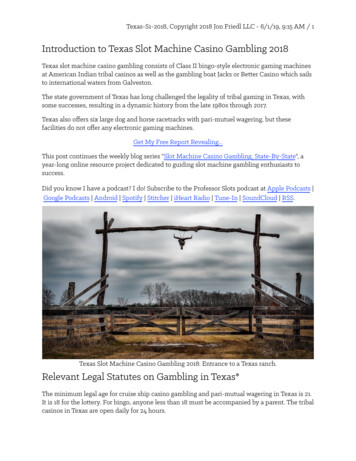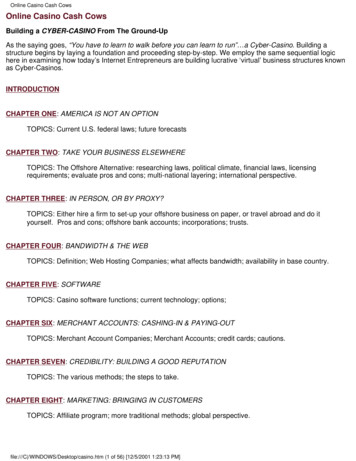
Transcription
Online Casino Cash CowsOnline Casino Cash CowsBuilding a CYBER-CASINO From The Ground-UpAs the saying goes, “You have to learn to walk before you can learn to run” a Cyber-Casino. Building astructure begins by laying a foundation and proceeding step-by-step. We employ the same sequential logichere in examining how today’s Internet Entrepreneurs are building lucrative ‘virtual’ business structures knownas Cyber-Casinos.INTRODUCTIONCHAPTER ONE: AMERICA IS NOT AN OPTIONTOPICS: Current U.S. federal laws; future forecastsCHAPTER TWO: TAKE YOUR BUSINESS ELSEWHERETOPICS: The Offshore Alternative: researching laws, political climate, financial laws, licensingrequirements; evaluate pros and cons; multi-national layering; international perspective.CHAPTER THREE: IN PERSON, OR BY PROXY?TOPICS: Either hire a firm to set-up your offshore business on paper, or travel abroad and do ityourself. Pros and cons; offshore bank accounts; incorporations; trusts.CHAPTER FOUR: BANDWIDTH & THE WEBTOPICS: Definition; Web Hosting Companies; what affects bandwidth; availability in base country.CHAPTER FIVE: SOFTWARETOPICS: Casino software functions; current technology; options;CHAPTER SIX: MERCHANT ACCOUNTS: CASHING-IN & PAYING-OUTTOPICS: Merchant Account Companies; Merchant Accounts; credit cards; cautions.CHAPTER SEVEN: CREDIBILITY: BUILDING A GOOD REPUTATIONTOPICS: The various methods; the steps to take.CHAPTER EIGHT: MARKETING: BRINGING IN CUSTOMERSTOPICS: Affiliate program; more traditional methods; global perspective.file:///C /WINDOWS/Desktop/casino.htm (1 of 56) [12/5/2001 1:23:13 PM]
Online Casino Cash CowsCHAPTER NINE: TAXESTOPICS: Honesty in paying U.S. taxes on foreign earnings, just to be safe and legal.CHAPTER TEN: A TRIAL RUNTOPICS: A fictitious example of a start-up Cyber-Casino.SUMMARY:TOPICS: Conclusion.BONUS I: Mark Joyner's Interview With Tom DickPlease refer back to the ebook at http://www.onlinecasinocashcows.com.BONUS II: Mark Joyner's Interview With Ray St. JohnPlease refer back to the ebook at http://www.onlinecasinocashcows.com.BONUS III: Mark Joyner's Interview With Connie BurstinPlease refer back to the ebook at http://www.onlinecasinocashcows.com.BONUS IV: ChecklistsBONUS V: LIST OF LINKSTOPICS: A list of helpful websites discussing different aspects of online gambling and aspects related toestablishing an Internet-based casino.INTRODUCTIONTHE INTERNET is an egalitarian Utopia in a raging sea of Capitalism.For those of you who are not Keynesian economists, that’s a hi-fallutin’ way of saying,‘The Internet makes all men equal in the Free Market.’Almost overnight, it has created a new breed of Entrepreneurial millionaire and has made some formermillionaires broke and obsolete. It is the ‘means’ to an ‘end’ (a la Machiavelli). It levels the playing field of globalCapitalism, availing all potential Entrepreneurs equally of its “means;” thereby giving them the power andcreative opportunity to achieve their own “end.”Wealth is not a prerequisite (nor a guarantee) for success on the Web. The Internet respects only drive, dreamsand the power of an idea. There is nothing out-of-bounds. There are no limits none, at least, which drive,file:///C /WINDOWS/Desktop/casino.htm (2 of 56) [12/5/2001 1:23:13 PM]
Online Casino Cash Cowsdreams, and ideas - combined with the power of the global Internet - cannot surmount.LAS VEGAS is an American institution. A worldwide phenomenon. An icon of Capitalism.It was founded on the idea whereby Entrepreneurs supply the “means” (physical locale and infrastructure) forpeople to enjoy their chosen “end” . . . pleasure, entertainment, escape, and the free exercise of human nature.Some may call it a vice. But let’s face it: to gamble to risk one’s smaller assets for the chance to win greaterwealth is human nature. And the desire to make money by meeting the demands of a free marketplace (agamble in itself!) is human nature.The power of the Internet has not only altered the nature of the dominant world economic system known asCapitalism, it has created a parallel Cyber-World in which people all across the far-flung Physical World caninteract ‘virtually,’ both Entrepreneurs and their free market customers.In the Physical World, Las Vegas is the center-of-the-universe for gambling as recreation, and also for theEntrepreneurial spirit that has developed and refined the business of gambling to meet market demand. It is theglobal brand name, the world market-share leader.But a parallel center for the parallel Cyber Universe has yet to emerge.A mere decade now since its emergence as the preeminent and re-defining tool of global Capitalism, theInternet is still a wide-open frontier, a border town in a No-Man’s Land on the edge of the known PhysicalWorld. The price of land in this virtual territory is cheap. Everyone can afford to buy their own 40 acres andbuild their own homestead. And the visionaries among us realize that in the sense of EntrepreneurialCapitalism, they can’t afford not to!In this new dimension of virtual existence and digital reality, law and order is still an amorphous concept.Cyber-Society’s norms and ethics are in their formative stages. Some may look to trans-plant traditional valuesand customs brought over from the Physical World. But often, this is like trying to control traffic flow on afreeway with the use of stop signs. Conventional methods and concepts are often outmoded here. They cannotbe automatically applied to conditions in a world for which they were not designed.The vastness of this virtual frontier is now being explored, charted, mapped and settled by Cyber Pioneers. Asthey carry it over from the Physical World and re-create Capitalism in Cyberspace, these visionaries are theones - by whom and for whom - new laws will be written, new ethics and standards established, and a newSociety founded; the digital plain of Cyberspace truly becomes a world unto itself.Meanwhile, back in the Physical World, Cyberspace is making old ways, old methods, and old thinkingobsolete. The pioneering Entrepreneurs who founded Las Vegas are nervous. Their once secure status as theexclusive masters of the gambling universe has been shaken, threatened.Under the old system, the sheer scope and cost of physical locale and infrastructure were prohibitive barriers elitist prerequisites - to an Entrepreneur’s participation in the lucrative casino gambling business.A GAMING CASINO in the Physical World is an amalgamation of tangible, physical entities: a massive housingstructure, a legion of trained and uniformed employees, an array of indoor amenities, a payroll, the flow andtracking of coins and cash, etc., etc., etc. Not to mention the requisite layer of primary infrastructure: roads,airports and public transportation to bring the eager customers in; hotel rooms to shelter them; restaurants tofeed them; support services to maintain them; etc., etc., etc.In this Physical World, the opportunity to run a lucrative casino gambling business has always been the secureand exclusive domain of mega-wealthy individuals and corporations.But no more! Why ?In essence, the Cyber Universe has lifted the elemental premise - the conceptual foundation - of thephenomenon that is Las Vegas and as a demonstration of the revolutionary power of Internet technology,file:///C /WINDOWS/Desktop/casino.htm (3 of 56) [12/5/2001 1:23:13 PM]
Online Casino Cash Cowsplaced it within the surprisingly easy reach of Joe P. Everyman and Jane Q. Public.Now, on the frontiers of Cyber World, infrastructure is mere computer software on a website. Transportation isa computer linked to the Internet. Trained, uniformed employees are computer graphics and sub-routines. Thetracking and flow of coins and cash is a charge on a credit card.In re-defining and advancing both simple and global Capitalism, Internet technology has not only brought downthe price of goods and services for consumers, it has exponentially expanded opportunity by exponentiallyreducing the cost of doing business for would-be Entrepreneurs.In other words, it has given Small-Scale Capitalists (i.e. “of lesser means”) access to opportunities that, in thePhysical World, are only realistically accessible to the obscenely wealthy.Suddenly, the impossible is now possible . . . in the domain of Cyberspace.For the second time in human history, we can justifiably talk about a “New World,” a “Land O’ Plenty” flowingwith the milk and honey of business opportunities never before seen.The Internet has opened up to John Q. Public a domain once exclusively available to millionaires and majorcorporations. Now, anyone with the dream and the desire can operate their own.CYBER-CASINO where customers won’t have to make flight reservations, face aggravating airport delays, catch long flights oncrowded planes, rent cars, check-in at hotels, etc., etc., etc., - all for the privilege of enjoying recreationalgambling. They’ll simply log-on to their computer, access the Internet, and type in the address of yourCyber-Casino website from the comfort of their own home!But basically, you already know all this.If you’ve downloaded and are reading this e-book, you are a business-minded person with technologicalforesight. You’re an Entrepreneur enticed by the vast moneymaking prospects of Internet gambling. You aresomeone with the soul of an investment capitalist who has sensed a ground-floor opportunity. (Like those of uswho wish we’d bought Microsoft stock way back when!)And you’re a person who wants to get in on that opportunity to climb on board the elevator NOW, before itheads skyward, leaving the slow-movers and faint-hearted behind, wishing they had been quicker and braver toact on this foresight.It is also likely that you’re an American citizen. More than half the world’s Internet users reside in America - thespiritual Mecca and shining inspiration of global Capitalism. (What a country!)Yet, that’s the irony!That’s the rub!Other than rare and random oases like Vegas, Atlantic City and certain autonomous Indian reservations out inthe middle of nowhere, the business of casino gaming and gambling is prohibited in the U.S.The Internet may be worldwide and a universe unto itself. Still, the U.S. government claims jurisdiction over thebusiness-related activities of its citizens who also claim residence in the traditional, non-Cyber World.Capitalism, according to Washington, D.C., has its limits.And in America, it is currently illegal to create, base or run an online gambling business in or from alocation within the United States. That’s not good news for domestic Entrepreneurs, since - as stated earlier- more than half of the planet’s World-Wide-Web users are Americans!So . . . what to do.?file:///C /WINDOWS/Desktop/casino.htm (4 of 56) [12/5/2001 1:23:13 PM]
Online Casino Cash CowsWell, you could drop the idea of running your own CYBER-CASINO and look around for another ground floorInternet opportunity.You could renounce your U.S. citizenship and transfer out of the Land O’ Plenty to some place less hospitablephysically, but more accommodating ‘virtually.’ You could ‘affiliate’ with an online casino and work simply as apromoter.You could flaunt federal law and play your own dangerous game of chance vs. the government, in which thestakes are fines and imprisonment.Or You can use to your advantage the “gray area” that is the current state of interactive legality between U.S.federal law and the Cyber World, and legally (technically speaking) create, own and operate a profitableelectronic gaming casino on the Internet.your own Virtual Las Vegas!In that spirit, aesop.com/aesop marketing corp. hereby states that in publishing this e-book, it is not advocatingillegality or illegal business practice. Neither is this meant to be a ‘how-to’ guide per se. Rather, it is a manifestoon the current state of affairs and emerging interest in the online gaming business, providing information andexamples of the methods and experiences of certain Entrepreneurs already in the field, as well as theirbusiness aims and actions, and the obstacles and pitfalls they’ve overcome.This book simply reports what others in this emerging field have done. Those contemplating following in theirfootsteps should consult a lawyer and other pertinent experts before moving to establish their own operations.We hope this information will be beneficial to future Cyber Pioneers preparing to blaze their own trails into thisexciting new wilderness, in search of The (Virtual) American Dream.««back to topCh 1 - America Is Not An OptionBOTTOM LINE: it is currently illegal to create, base or run an Internet-based gambling business in orfrom a location within the United States.Other than the fact that this reality is not likely to change any time soon, the above sentence in italic-bold printis all a potential Cyber-Casino owner really needs to know. Legally speaking, he CANNOT physically be onAmerican soil while personally erecting the foundation for the Cyber-Casino and can’t take a hands-on role inits operation while here.Unless a U.S. citizen chooses the drastic step of renouncing that citizenship and taking-up permanentresidence in a country where online gaming is legal, all applicable Federal laws must either be complied with ormade non-applicable to the business venture being established.Hence as a first step in one’s foundation of knowledge, a short course in current Federal statutes regulatingonline gambling is in order. In other words, knowing the law is an Entrepreneur’s first step to ensuring that thepunitive consequences of that law do not apply to him.Online gaming and gambling is a pressing social concern and hot topic now under debate in Congress. As ofour date of publication, the following is verbatim text (edited for space) of five existing U.S. federal laws orproposed laws (bills) regulating online gaming and gambling:Law #: 18 U.S.C. §§ 1081, 1084Official Title: FEDERAL INTERSTATE WIRE ACT OF 1960file:///C /WINDOWS/Desktop/casino.htm (5 of 56) [12/5/2001 1:23:13 PM]
Online Casino Cash CowsCongressional Sponsor(s): N/ADate Introduced: N/ADate Passed Into Federal Law: 1961Latest Vote on Bill: N/AStatus: Law. Basis for current government regulation of Internet.Complete Text of Bill Online at: http://www.startcasino.com/wireact.htmMost Pertinent Text: "Whoever being engaged in the business of betting or wagering knowingly uses a wirecommunication facility for the transmission in interstate or foreign commerce of bets or wagers or informationassisting in the placing of bets or wagers or for the transmission of a wire communication which entitles therecipient to receive money or credit as a result of bets or wagers shall be fined or imprisoned or both.”Legislative Analysis: This 40-year-old law prohibits the use of wire communication facilities (telephone andtelegraph lines, etc.) in placing bets and transmitting data regarding bets to or from a U.S. state, commonwealthor a foreign country where such activity is illegal.This statute gives the federal government jurisdiction over matters involving interstate wire communications.The Internet, according to current legislative interpretation, falls under the jurisdiction of this law (and within thepower of the federal government to regulate) because phone lines largely carry its transmissions.Others disagree, arguing that the Internet is a worldwide instrument of infrastructure and, as such, is not underthe jurisdiction this U.S. federal law. They say the 1961 law is outdated, written in and applying to a time whena gambler phoned his out-of-state bookie to place a bet.A Supreme Court test case to determine the applicability of the Federal Interstate Wire Act of 1960 to Internetcommerce is expected in the near future.****Bill #: S. 692 IS (S. 474 RS is an earlier version of S. 692 IS. See below.)Official Title: INTERNET GAMBLING PROHIBITION ACT OF 1999Congressional Sponsor(s): Sen. John Kyl (R-Arizona)Rep. John Goodlatte (R-VA)(Companion Bill in House: H.R. 3125 IH)Date Introduced: 3/23/99Date Passed Into Federal Law: ----Latest Vote on Bill: 11/19/99. Approved by Full Senate.Status: Not yet law. Further action pending.Complete Text of Bill Online at: htm (Link notworking)Most Pertinent Text:“It shall be unlawful for a person engaged in a gambling business to use the Internet or any otherinteractive computer service to place, receive, or otherwise make a bet or wager.”“In this section: the term ‘person’ means any individual, association, partnership, joint venture,corporation, or entity as defined in section 3701(2) of title 28, United States Code).”file:///C /WINDOWS/Desktop/casino.htm (6 of 56) [12/5/2001 1:23:13 PM]
Online Casino Cash Cows“The term ‘gambling business’ means a business that involves the placing, receiving, or making ofbets or wagers or involves 1 or more ‘persons’ who conduct, finance, manage, supervise, direct or ownall or part of such businesses.”“The term ‘bets or wagers’ means the staking or risking of something of value upon the outcome of acontest of others, a sporting event, or a game of chance.”Legislative Analysis: With a sense that its predecessor (S. 474 RS) had over-extended a prudent reach andwas on shaky legal ground by putting a blanket prohibition on all aspects of Internet gambling (includingactivities by individual gamblers), legislators designed S.692 IS to ban only the actual businesses(Cyber-Casinos) using the Internet to engage in gambling.Such specific targeting of Cyber-Casinos, plus a list of non-gambling-related activities that are exempt from thepurview of the proposed law, helped to eliminate congressional opposition and led to its 1999 passage in theSenate. It will be merged with a bill yet to be passed by the House of Representatives, which will then be put toa final vote in both Houses.The bill authorizes both federal and state authorities to pursue and prosecute Offenders.In an important development that helped ensure the bill’s Senate passage in 1999, Internet Service Providers(ISP’s) were exempted from liability under the proposed law for hosting offenders, and bear no responsibility forscreening or monitoring for violators, as long as the ISP’s shut-off service to Offenders when notified to do soby law enforcement authorities.It is interesting that, in making these concessions and targeting only Cyber-Casinos, S. 692 IS picked-up theexpressed support (or at least discontinued opposition) from interests such as: (1) legalized land-based andriverboat gambling operations, which seek to discourage and limit new entrants into the gambling field; (2) stateand local governments, which receive substantial tax revenues from legalized gambling operations andassociated hotel/restaurant/entertainment activities; and (3) state-run lotteries, which enjoy a monopoly.****Bill #: S. 474 RS (This was the initial, unamended version of S. 692 IS)Official Title: INTERNET GAMBLING PROHIBITION ACT OF 1997Congressional Sponsor(s): Sen. John Kyl (R-Arizona)Rep. John Goodlatte (R-VA)(Companion Bill in House: H.R. 3125 IH)Date Introduced: 10/23/97Date Passed Into Federal Law: ----Latest Vote on Bill: 07/23/98. Approved by Senate, 90-10.Status: Not yet law. Further action Pending.Complete Text of Bill Online at: http://techlawjournal.com/Internet/s474rs.htmMost Pertinent Text:“It shall be unlawful for aperson to place, receive or otherwise make a bet or wager via the Internet or any other interactive computerservice in any State.”file:///C /WINDOWS/Desktop/casino.htm (7 of 56) [12/5/2001 1:23:13 PM]
Online Casino Cash Cows“It shall be unlawful for a person engaged in the business of betting or wagering to engage in that businessthrough the Internet or through any other interactive computer service in any State.”“In this section: the term ‘person’ means any individual, association, partnership, joint venture, corporation, or entity as defined in section 3701(2) of title 28, United States Code).”“The term ‘bets or wagers’ means the staking or risking of something of value upon the outcome of a contestof others, a sporting event, or a game of chance.”“The term ‘Internet’ means the international computer network of both Federal and non-Federal interoperablepacket switched data networks.”“The term ‘interactive computer service’ means any information service that provides or enables computeraccess by multiple users to the Internet.”“The term ‘State’ means a State of the United States, the District of Columbia , Puerto Rico, or acommonwealth, territory, or possession of the United States.”Legislative Analysis: A far broader (and legally more vulnerable) bill than the revamped S. 692 IS bill thatfollowed, S. 474 RS nevertheless obtained overwhelming passage in the U.S. Senate in 1998 on a 90-10 vote,spurred by support from the Christian Coalition, Ralph Nader, and state, local and federal government lawenforcement agencies.In essence, the bill invokes the broad powers of the Federal Interstate Wire Act of 1960, and amends the40-year-old law to specify legal applicability to (and jurisdiction over) the Internet. It would prohibit bothindividual customers and also Cyber-Casino businesses based in the U.S. from placing or receiving a bet viathe Internet.It is assumed that the primary thrust of governmental enforcement activity would be directed toward gamblingbusinesses; but measures are included for punitive measures against individuals, making it more vulnerable tolegal challenges.The revamped S. 692 IS, also sponsored by Sen. John Kyl (R-Arizona) sought to skirt such anticipatedchallenges by listing numerous exemptions to the law, and by carefully aiming the enforcement thrust of theproposed law solely at Internet gambling businesses (Cyber-Casinos).****Bill #: H.R. 3125 IH (Prior Version: H.R. 2380; died in Committee)Official Title: INTERNET GAMBLING PROHIBITION ACT OF 1999Primary Congressional Sponsor: Rep. John Goodlatte (R-Virginia)Sen. John Kyl (R-Arizona)(Companion Bill in Senate: S. 692 IS )Date Introduced: 10/21/99Date Passed Into Federal Law: ----Latest Vote on Bill: 7/17/01. Failed; 25 votes short of 270 needed (2/3 majority).Status: Further action pending. Expected re-vote.Complete Text of Bill Online at: h.htmMost Pertinent Text:file:///C /WINDOWS/Desktop/casino.htm (8 of 56) [12/5/2001 1:23:13 PM]
Online Casino Cash Cows“ it shall be unlawful for aperson engaged in a gambling business knowingly to use the Internet or any other interactive computer serviceto place, receive or otherwise make a bet or wager; or to send, receive or invite information assisting in theplacing of a bet or wager.”“In this section: the term ‘person’ means an individual, association, partnership, joint venture, corporation orentity as defined in section 3701(2) of title 28, United States Code.”“The term ‘gambling business’ means a business that involves the placing, receiving, or making of bets orwagers or involves 1 or more persons who conduct, finance, manage, supervise, direct or own all or part ofsuch businesses.”“The term ‘Internet’ means the international computer network of both Federal and non-Federal interoperablepacket switched data networks.”“The term ‘bets or wagers’ means the staking or risking of something of value upon the outcome of a contest ofothers or a game predominantly subject to chance.”Legislative Analysis: The measure would ban all forms of gambling over the Internet not currently legal underthe laws of the states in which they are located. (For example, regulated intra-state or multi-state lotteries.)Again, as with other bills, the target of this proposed law is online Cyber-Casinos, access to which is availablethrough the Internet to people in all 50 States and around the world. Hence, H.R. 3125 IH does not affectgambling casinos in Las Vegas and Atlantic City. In fact, they support its passage because it would eliminatecompetition from online Cyber-Casinos.Due to intense lobbying from the racing industry, betting on live horse-racing, dog-racing and jai alai isexempted from the prohibitions of H.R. 3125 IH as long as wagering activity is conducted on a “closed-loop”subscriber-based system legal in its State of location.(Broad language in bill H.R. 2380, a prior version of H.R.3125 IH, would have prohibited this “closed-loop”activity as well as all Internet gambling. H.R. 2380 died in Congressional committee. H.R. 3125 IH is Rep.Goodlatte’s second attempt at sponsoring it.)Although the aforementioned “closed-loop” systems technically are “interactive computer systems” which linksrace tracks to provide simulcasts of events, gambling information, and to facilitate gambling activity, they arenot considered Internet-accessible because they are not open to the general public. Rather, participants mustbe registered users of these “closed-loop” gambling systems, which are operated under State law. Further,participants must be physically present in the State and at the gambling facility in order to participate. Such isnot the case with would-be participants seeking access via the InternetThe bill would require Internet Service Providers (ISP’s) to disconnect services to illegal Internet gamblingoperations upon notification by federal or state government enforcement officials and/or to block customeraccess to such Internet sites made illegal by H.R. 3125 IH.****Bill #: H.R. 4419 IHOfficial Title: INTERNET GAMBLING FUNDING PROHIBITION ACTCongressional Sponsor(s): Rep. James Leach (R-Iowa)Date Introduced: 5/10/00Date Passed Into Federal Law: -----file:///C /WINDOWS/Desktop/casino.htm (9 of 56) [12/5/2001 1:23:13 PM]
Online Casino Cash CowsLatest Vote on Bill: 06/28/01. Bill amended by House Banking Committee.Status: Not yet law. Further action pending.Complete Text of Bill Online at: h.htm(NOTE: With amendment by House Banking Committee, new text will be added to the bill.)Most Pertinent Text:(3a) “No person engaged in a gambling businessmay knowingly accept with the participation of another person in Internet gambling credit (including the useof a credit card); an electronic transfer of funds; any check (or) draft drawn on or payable through anyfinancial institution .”(5) (Amending the Federal Deposit Insurance Act (12 U.S.C. 1818))(x) “ if any Federal banking agency determines that any insured depository institution is engaged in any ofthe following activities, the agency may issue an order prohibiting such institution from continuing to engage insuch activity:(1) “Extending credit, or electronic fund transfer with actual knowledge that any person is violating theInternet Gambling Funding Prohibition Act.”(2) “Paying, transferring or collecting on any check, draft, or other instrument drawn on any depositoryinstitution with the actual knowledge that any person is violating the Internet Gambling Funding Prohibition Act.”Legislative Analysis: H.R. 4419 IH, if passed into law, would ban U.S. financial institutions and moneytransmitting services from knowingly allowing the use of banking instruments (checks, credit cards, wiretransfers, etc.) by Internet gambling operations or their intermediaries, such as banks or agents.It also prohibits gambling business from accepting credit, electronic money transfers, checks or other financialinstruments as payments from customers in the course of doing business.The intended effect of this proposed law is to make it harder for Cyber-Casinos and Internet betting operationsto conduct business with customers by cutting them off from banks. In other words, make it more difficult toarrange the pre-payment of bets from gambler to casino, and the payment of winnings from casino to customer,by prohibiting the involvement of banks, etc. in such transfers of money.There seems to be more broad-based Congressional support for this alternative (regulating financialinstitutions), rather than seeking prohibitions and penalties against individual citizen gamblers. Prohibitionsagainst the latter would be more difficult to enforce.As amended by the House Banking Committee on June 28, 2001, the prohibitions of HR 4419 IH would applyonly “where such bet or wager is unlawful under applicable Federal or State law in the State in which the bet orwager is initiated, received or otherwise made.”This provision exempts gamblers who use checks, credit cards or wire transfers to place bets in places like LasVegas and Atlantic City (where gambling is legal). It also exempts the financial institutions that enact paymenton such checks, credit cards or wire transfers for gambling in places where it is legal.Hence, the law caters to the status quo of legalized U.S. gambling operations and seeks to deny entry to theindustry by would-be competitors such as Cyber-Casinos, forcing them to skirt the prohibitions by taking theirventures to offshore locations.****This brief overview of four bills currently pending in Congress, plus the 1960 law that is their foundation,file:///C /WINDOWS/Desktop/casino.htm (10 of 56) [12/5/2001 1:23:13 PM]
Online Casino Cash Cowspresents an accurate view of the lay-of-the-land in terms of future legislative action toward restrictive federalregulations against gambling and the Internet.It’s coming. It will happen.The proposed bills are backed by people, politicians, corporations and conglomerates who are themselvesdivided between good intentions and self-serving motives.Politicians may call their bills “Internet Gambling Prohibition Acts.” But the glaring reality and hypocrisy is thatonly forms of gambling that have little or no political clout and lobbying presence are prohibited. Large,established gambling operations (such as Las Vegas, horse racing, etc.) maneuver behind the political scenesto legalize and insulate their own operations while raising barriers against would-be competitors with lesspolitical clout and financial means.Althoug
Online Casino Cash Cows Building a CYBER-CASINO From The Ground-Up As the saying goes, "You have to learn to walk before you can learn to run" a Cyber-Casino. Building a structure begins by laying a foundation and proceeding step-by-step. We employ the same sequential logic
